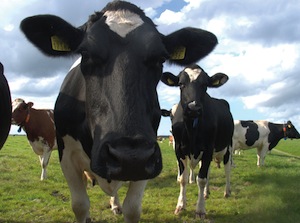
By Eve Mitchell
The facts show that Europeans roundly reject clones for food:
- 61% think all cloning is morally wrong,
- 58% say it can never be justified for food production,
- and a whopping 83% say that any clone use in the food chain MUST be labelled.
What’s more, under considerable pressure for years, the EU Parliament admirably demands a full ban on all clones — and, critically, their offspring — in our food.
So what’s the point of this February 23 public meeting of Parliament’s Environment and Agriculture Committee, titled “Cloning of animals for farming purposes”?
Sadly, the Parliament’s wishes for a ban on clones are still being fought by two of the three branches of the EU system.
The Commission and Council insist that it’s not possible to implement a ban or enforce labelling when it comes to cloning.
The Council adds that a ban would violate international trade rules.
Many citizens might just think that’s too bad — trade should serve us, not the other way around. Also, after all the noise made about livestock traceability when horsemeat started turning up as “beef”, it’s a real eye opener to see such a clear admission that it “isn’t possible” to trace the animals used to produce our food. It’s almost like they think we have to take whatever we are given!
So, we’re still talking about cloning.
In 2013, the Commission tabled its ethically contorted draft laws that, disturbingly, would open the door to unlabelled clone offspring in Europe’s food chain. There’s now something of a stalemate, with those draft rules poised to move towards law when the Commission thinks it can get them through.
Why this should be the case is a mystery, since it is unclear if anyone actually wants the stuff. Even the UK National Farmers Union, so woefully out of step on GM food and crops, admits, “Ultimately it is the consumer who will decide.” Similarly Copa-Cogeca (“The united voice of farmers and their co-operatives in the European Union”) admits, “Farmers have to respond to consumer demand, and cloning does not currently seem to be feasible either from an economic or market point of view.” End of story, right?
Wrong. There are other reasons to worry. The U.S. Food and Drug Administration (FDA) permits food from clones to be unlabelled in the food supply. While the FDA urges an informal moratorium on cloning (presumably to protect export markets), and while some major U.S. food companies have banned food from clones, Europeans can’t rest assured that this food isn’t making its way on to our tables via imports.
Furthermore, the Commission and others make much of the European Food Standard Agency’s (EFSA) position that “there is no indication” of any food safety concern, or at least not yet — most gloss over the fact that EFSA also concluded that its risk assessment includes “uncertainties” because of a lack of data. It’s an ethical, democratic and scientific black hole, not sound food policy. Only a properly enforced ban will do.
We’re keeping an eye on things at the EU level so we can raise the alarm if those draft laws move any closer to becoming law. We’ll need you to help.
Expect to hear more from us about cloning, so you can do something about it.


